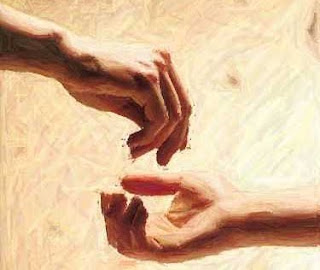2- "Prayer": "Five times a day"... "Fridays"... The "Salat": To pray 5 times a day, facing toward Mecca. The person bows, kneels, and then into a prostate position with the forehead touching the ground, wherever he is...
Before prayer, the body must be purified by water, or sand if water is not available. The hands, feet, and face all are to be washed. Even the bathrooms are so arranged that the occupant will face in the direction of Mecca. The summons for prayer is announced by a "muezzin" (caller) from atop a "minaret" (tall tower).
The essential prayer is the Shahada just described. And the most common and important in both private and public worship is the Sura 1, "The Opening":
Praise be to God, Lord of the Universe!, The compassionate, the Merciful, King of the Day of Judgment!. You alone we worship, and to you alone we turn for help. Guide us to the straight path, The path of those whom You have favored, Not of those who have incurred Your wrath, Nor of those who have gone astray".
This "opening Sura", is the one of the "straight path"... if a Muslin were asked to summarize the way his religion councils man to live, he may answer: "Islam teaches man to walk in the straight path".
On "Fridays", at noon, Muslims congregate in the Mosques for the "Assembly", to pray with a special "salat", and the sermon.
The officials of the Mosque are, the "iman" (leader), the "preacher", and the "muezzin" (who calls to prayer from the minaret). No priests.
One of the most impressive sights in the religion of man occurs when, in a dimly lighted mosque, hundreds of men stand shoulder to shoulder, then kneel and prostate themselves toward Mecca.
The "call to prayer" ("adhan"), is made 5 times a day by the "muezzin ("caller") from all the minarets in the world, and now from radio and television in the 5 continents, and always in Arabic: It consists of 7 short statements, the most important phrases of the Arabic language:
Allahu akbar! (God is the greatest!). Allahu akbar!. La ilaha illa Allah (there is no God but Allah). I testify that Muhammad is the prophet of Allah. Arise and pray; arise and pray. Allahu akbar. La ilaha illa Allah.
"Muslims" pray very much, with fervor, and respect, it is the basis of their success!.
The "Tasbih" ("Rosary"), or "Subha": On top of praying 5 times a day, the Muslims have always at hand their "tasbih" (rosary), similar to the one of the Catholics, but with 99 beads, corresponding to the 99 attributes the Koran gives to God: The "Compassionate", the "Merciful"... or to the 99 times the Koran mentions the name "Allah". They have also a "smaller Rosary", with 33 beads, one third of the regular one.
When you visit any Muslim Country, the peasants are all day praying and playing with their tasbih (rosary), usually with the smaller one.
TO RETURN TO THE 5 PILLARS CLICK HERE









